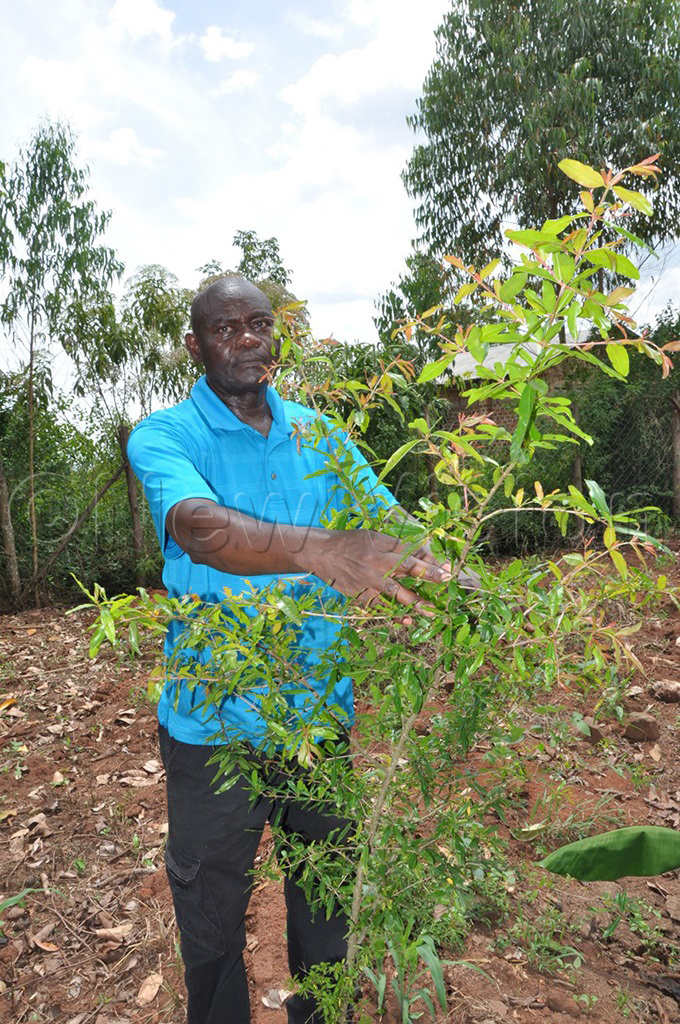Pomegranate, the 'golden fruit of life'
The nutritious nature of the fruit has played a role in its increased consumption, especially in the form of juice and other processed products. While the fruit receives less attention from Ugandan farmers, Senyange says it has huge potential for both local and international markets.
FARMING POMEGRANATE
James Senyange a Ugandan based in Canada does not claim to be an experienced farmer, but a casual chat with him reveals just how knowledgeable he is in farming.
He is particularly interested in pomegranate, a fruit that has organic acids, vitamin C, polysaccharides, essential minerals and antioxidants.
He says this fruit has compounds with antioxidant activity, including ascorbic acid, flavonoids and phenolic.
 Senyange shows a young pomegrante
Senyange shows a young pomegrante
The nutritious nature of the fruit has played a role in its increased consumption, especially in the form of juice and other processed products.
While the fruit receives less attention from Ugandan farmers, Senyange says it has huge potential for both local and international markets.
Pomegranates are largely sold in supermarkets owned by Indians. Their seeds "have been used for medicinal purposes for thousands of years," information on the UK's National Health Services (NHS) website, says.
"It is a tropical perennial plant native to India and Indonesia and is cultivated throughout the tropics around the world".
The market seeks relatively blemish free, medium to large fruit, with plenty of red colour evident, both externally and in the juicy sub acidic pulp surrounding each seed.
Known as the "the 'golden fruit of life", pomegranate is one of the most essential fruits in Canada according to Senyange. It is also embraced for its medicinal properties as well.
But why is its production still low in Uganda?
Senyange says lack of awareness on the potential and uses of pomegranate is among reasons why most Ugandans do not go into its production.
"In fact pomegranate production is left in the hands of few farmers because first of all it takes two -three years to start fruiting, yet some farmers see it as a long time for it."
He also says low pomegranate production in Uganda is due to lack of credit facilities for smallholder farmers, a situation that makes it difficult for them to procure fertilisers and other agro-chemical inputs for sustainable pomegranate enterprise.
Pomegranate is a tree or shrub that adapts to most regions where citruses grow well. These areas have hot temperatures that receive adequate sunlight to allow the ripening of the fruits.
The crop that matures in three years does well in well-drained soils, thus, those with high clay content should be avoided.
Normally, pomegranates grow 5-10m high with multiple branches. Being a bushy plant, pruning is essential as too many branches result in stem breakages due to overweight and prevents the shrub flowers are bright red but there are some fruitless varieties that are grown for aesthetic purposes.
Cultivating it
The fruits' husks have two parts, an outer hard pericarp and an inner spongy mesocarp, which comprises the wall of the fruit where seeds attach.
The edible part is usually the berry with seeds and pulp produced from the ovary of a single flower. The trees are drought-tolerant but can be grown in wet areas, where the crop would, however, be prone to root decay.
A farmer growing them in wet areas should ensure there is proper drainage before investing in their production.
Senyange advises farmers to put PH before planting and this should be adjusted to 6.5 and phosphorus fertilisers should be incorporated in the soil if levels are low.
The soil should have a good depth, hence the need to carry out proper land preparation, which should be done early enough while ensuring well-decomposed manure is incorporated in the soil.
The crop grows easily from the seeds and can be propagated using cuttings of 25-40cm to avoid the genetic variations.
Aisha Nabossa, the manager at Shatwa Mixed Farm, says for good crop yield and maximum farmer economic return, it is advisable to mulch a pomegranate plot after planting and fertilise it using a combination of inorganic fertiliser such as poultry or cow dung manures.
Health impact
Pomegranates have a number of health benefits, which include slowing the progress of prostate cancer, reducing the damage caused by cholesterol on arteries and improved blood flow. Additionally, pomegranates lower risk of heart attacks.
Pomegranate is a red apple-like fruit with a thick inedible skin but the seeds are what people eat either raw or after being blended into juice.